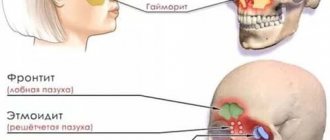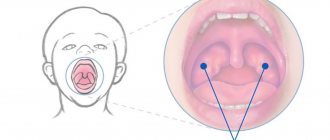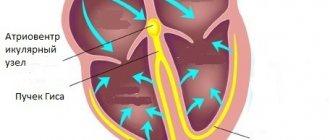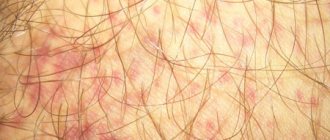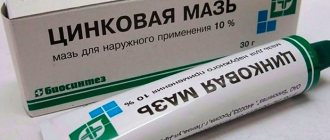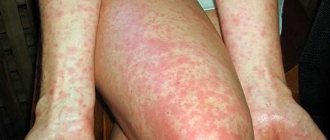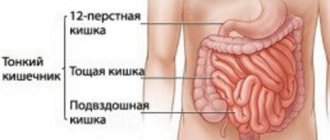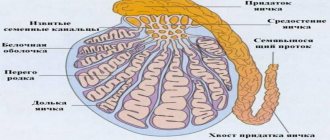Author's rating
Author of the article
Shutofedova Ksenia Yurievna
General practitioner
Articles written
578
about the author
At an early age, children often suffer from colds. ARVI can provoke sore throat in a child. Children's doctor Evgeniy Komarovsky focuses the attention of parents on the fact that sore throat is the “folk” name for a disease such as acute tonsillitis. Acute tonsillitis is an inflammation of the tonsils. The cause of tonsillitis is infection. But Dr. Komarovsky does not recommend taking medications right away.
Komarovsky about the disease
The name Evgeny Komarovsky is known to almost every mother. Many parents turn to him for advice. One of the most frequently asked questions to pediatricians is how to properly treat tonsillitis in a baby?
According to the doctor, parents confuse tonsillitis, or acute tonsillitis, with chronic tonsillitis. These two diseases are similar, but have different symptoms. Therefore, the treatment is different. Angina always occurs in an acute form. The baby's temperature rises sharply and he complains of a sharp sore throat. Upon examination, the child is observed to have swelling and plaque on the tonsils.
If acute tonsillitis is not treated in time, it can become chronic. Chronic tonsillitis has similar symptoms, but its course is more measured and calm. It is more difficult to treat this form of the disease.
Parents should not delay treatment of sore throat. Komarovsky recommends carefully listening to the child’s complaints. Frequent complaints of sore throat indicate that the baby has a weakened immune system.
The disease can occur in a simple and complex form. In the simple form, the disease proceeds without visible complications. The enlargement of the tonsils is slight, and there is also not strong, but noticeable pain when swallowing.
The second, and more dangerous form is toxic-allergic tonsillitis. The patient's lymph nodes are enlarged, and complications may also occur in the internal organs. If these symptoms occur, the child should be treated immediately on an outpatient basis. Under no circumstances should you resort to traditional methods of treatment or self-medicate. Only an experienced specialist can prescribe the necessary course of treatment.
At first, the disease is easily confused with ARVI. Komarovsky recommends paying special attention to visible symptoms. For example, a runny nose and cough are the first signs of ARVI. A well-known pediatrician draws attention to the fact that improper treatment can only complicate the situation. An advanced disease can lead to a number of complications.
Sore throat is more often observed in children. Until the age of three, according to pediatrician Komarovsky, acute tonsillitis is not possible. Tonsils are just forming before this age. After fifteen years, the likelihood of getting sick is also reduced to a minimum. Adults get sick much less often.
The main route of infection with bacteria that cause tonsillitis is through the air. Sore throat is very contagious, so when communicating with a carrier, the risk of infection increases. If the pathogen is staphylococcus, there is a chance of infection through food.
The opinion of the great professor about tonsillitis.
Prevention
Preventive measures to prevent the occurrence of sore throat in children should include:
- strengthening the immune system, hardening;
- frequent walks in the fresh air;
- moderate physical activity;
- proper nutrition, rich in vitamins and microelements;
- maintaining oral hygiene;
- avoiding contact with sick people.
Sore throat as an infectious disease requires special attention and approach to treatment. The absence or lack of treatment for sore throat can lead to quite serious and dangerous consequences. Therefore, you should not let the disease take its course and self-medicate, but rather consult a doctor who will prescribe adequate treatment with effective medications.
Tonsillitis causes of development
In his programs, Evgeny Komarovsky focuses on the causes of tonsillitis. Parents turn to the pediatrician when their child complains of a sore throat. If, upon examination, the baby has obvious signs of enlarged tonsils, this does not yet allow the pediatrician to make a diagnosis of tonsillitis.
Enlarged tonsils may be a sign of an acute respiratory disease. But the reasons for the development of the disease are completely different.
ARVI is a viral disease. Therefore, the cause is infection of the respiratory tract with a viral infection. The inflammation passes without suppuration and is accompanied by a runny nose, headache, and body aches.
In addition, tonsillitis can act as a complication after improper treatment or if ARVI is not treated. An organism weakened after illness is easily susceptible to harmful microorganisms and adverse environmental factors.
The cause of acute tonsillitis is a bacterial infection. Harmful microorganisms, entering the respiratory tract, settle on the palatine tonsils. There they begin to actively multiply and cause an inflammatory process. As a result, it is painful for the baby to swallow, speak, and a purulent plaque forms on the tonsils.
The purulent process causes intoxication of the entire body. The immune system actively fights infection. The child's temperature rises sharply.
The main causative agents of acute tonsillitis:
- beta-hemolytic streptococcus is the main pathogen in ninety cases of the disease;
- Staphylococcus aureus can also cause tonsillitis;
- Pneumococci, corynebacteria and Haemophilus influenzae may occur very rarely.
Sore throat is a contagious disease. But not everyone becomes infected when interacting with infected people. It all depends on the immune system. People who have recently had or are still suffering from ARVI have a much higher risk of becoming infected. A healthy body is able to resist infection.
One of the causes of tonsillitis is ARVI.
Treatment without antibiotics
As mentioned above, Komarovsky does not recommend treating purulent sore throat without antibiotics. Rinsing and local treatment with sprays bring temporary visible relief. Topical medications (lozenges, lozenges, sprays) are auxiliary therapy.
They do not inactivate bacteria. On the contrary, their thoughtless use leads to addiction of the pathogen and increased virulence.
Of course, it is not forbidden to gargle or use medicinal lozenges with anesthetic. But it should be remembered that the basis of treatment for angina is antibacterial agents.
Without antibiotics, you can cure “red throat” - acute non-purulent tonsillitis, but not purulent tonsillitis.
In addition to basic drug treatment, it is necessary to:
- Stick to bed rest. It is dangerous to have a sore throat on your feet; there is a risk of heart complications.
- Provide plenty of warm drinks (teas, dried fruit compotes, rosehip infusions, fruit drinks).
- Prepare easy to eat but nutritious food. It is important to maintain appetite and the supply of nutrients to a sick body.
At home, infusions and decoctions of medicinal herbs (chamomile, sage), soda and saline solutions are prepared. For rinsing, the solution temperature should be 40 - 50°. It is advisable to gargle after each meal or 5 - 6 times a day.
You should be wary of traditional medicine advice, especially warming your throat. With purulent sore throat, the condition will only worsen.
Is sore throat contagious? Komarovsky answers in the affirmative: yes, very much so! Non-contagious tonsillitis is not diagnosed. Again, this should not be confused with redness of the throat. Sore throat is represented by a complex of symptoms that arise as a result of the development of infectious diseases (diphtheria, scarlet fever, infectious mononucleosis).
Sore throat is an acute infectious disease that has specific clinical signs and is caused by a specific pathogen. The disease will not occur only if you eat cold food, drink or get your feet wet. It is necessary to add to these factors the source of the pathogen - a sick person - and communicate with him. Only then, with a decrease in immunity, which is facilitated by hypothermia, and exposure to a pathogen, can you get a sore throat.
According to statistics, approximately half of the population has experienced a disease such as tonsillitis at some time in their lives. It is enough for parents to notice the redness of the throat in children and make such a diagnosis. E.O. Komarovsky, a doctor of the highest category with extensive practical experience, believes that a child’s sore throat should be diagnosed based on completely different criteria. In practice, 99% of people do not have a correct understanding of this disease. In the diagnosis and treatment of sore throat in children Komarovsky E.O. doesn’t see any particular difficulties. But parents will benefit from information about the general concepts of immunity and the disease itself.
Symptoms of tonsillitis in children
So that the doctor can prescribe the correct and effective treatment, it is necessary to highlight the main symptoms inherent in tonsillitis. There are a number of signs that can appear both with angina and with other diseases of the respiratory system.
You should carefully monitor how the inflammatory process proceeds. The most basic signals:
- temperature rise to forty degrees;
- the child has difficulty swallowing;
- tonsils are inflamed, with a white coating;
- enlarged lymph nodes;
- the child often has an unpleasant odor from the mouth;
- possible diarrhea;
- general malaise of the body – body aches, severe headache.
In his lectures, Dr. Komarovsky draws the attention of parents to the presence of a runny nose and cough in the baby. If so, then the doctor is sure that the patient has a common cold. You should not sound the alarm and start giving the patient antibiotics until acute tonsillitis is fully diagnosed.
At the same time, if a child often suffers from sore throat, chronic tonsillitis may develop. The symptoms of the disease are not so pronounced. The temperature rises to thirty-eight or thirty-nine degrees. The voice is hoarse, enlarged lymph nodes are possible.
Enlarged lymph nodes.
How to treat a sore throat?
Before proceeding to treatment, Dr. Komarovsky repeats more than once that the diagnosis of tonsillitis must be clearly established. This differentiation is especially necessary with tonsillitis, which often “triggers” the sore throat itself. Here the approach to treatment will be different.
- With tonsillitis, there are also white spots (plaques), but this disease occurs against the background of low-grade fever and is chronic. In addition, many people do not suffer from tonsillitis, but according to Komarovsky’s observations, everyone has suffered from a sore throat at least once in their life.
- Sore throat is an acute process, with violent symptoms, and therefore treatment also requires quite intensive treatment.
Antipyretics are used for treatment, these can be Panadol or ibuprofen. If the disease is viral in nature, antiviral drugs are recommended. If the sore throat is bacterial, all you need is an antibiotic!
Antiseptic agents are suitable for disinfecting the throat, such as:
- chlorophyllipt,
- lugol,
- stomatidine,
- orasept.
Tantum verde, ingalipt, and faringosept give good results.
Otolaryngologists recommend gargling with solutions prepared from the following agents: chlorophyllipt, furatsilin, boric acid, potassium permanganate and others. The frequency of rinsing for sore throat should be intense - every two hours.
Antibacterial therapy is in most cases necessary for angina. Penicillin drugs (augmentin, amoxiclav, flemoxin) are considered effective antibiotics for angina; it is with this group that treatment begins.
If a child is intolerant to penicillins, analogs are used, for example, azithromycin (macrolide). Cephalosporins (Suprax, Cefazolin, Ceftriaxone) are also widely used.
As for traditional methods, most doctors will definitely answer in the negative. Only antibacterial drugs can cure a sore throat. Of course, if the sore throat is viral, herpes or fungal, you will need appropriate medications to eliminate the cause. But, as a rule, with all types of sore throat, culture results show pathogenic growth of bacterial microflora.
Treatment of tonsillitis in children
Before prescribing treatment, the doctor must make sure what form of the disease is occurring in the little patient.
Chronic tonsillitis should be treated immediately after the pediatrician makes the diagnosis. Since the cause of the disease is a bacterial infection, symptomatic treatment will not help. Dr. Komarovsky warns that under no circumstances should you treat a sore throat with sucking tablets or lozenges. Even the instructions say that they are of an auxiliary nature. It is necessary to fight harmful microorganisms.
For sore throat, an antibacterial agent must be prescribed, says Komarovsky. In parallel with the treatment of the source of the disease, symptomatic treatment is prescribed. This could already be lozenges for a sore throat or a spray. Their role is to relieve the discomfort of tonsillitis.
The pediatrician determines the dosage and duration of treatment individually for each patient. It depends on the form and complexity of the disease.
If acute tonsillitis is accompanied by high fever, the doctor prescribes antipyretic drugs. Most often, children are prescribed medications whose main component is Paracetamol or Ibuprofen. It is advisable to lower the temperature when it exceeds thirty-eight degrees. According to Dr. Komarovsky, the child’s body must fight bacterial infection on its own. Doctors prescribe medications that help the body overcome the disease.
If treatment is started in a timely manner, acute tonsillitis will quickly go away. Incorrect treatment or its absence can cause a protracted process of the chronic form of the disease, Evgeniy Komarovsky always reminds. Chronic tonsillitis is very difficult to treat.
Many people listen to the opinion of Evgeny Komarovsky. It's no secret that the famous pediatrician is of the opinion that any disease should be treated with more conservative methods. But not in the case of sore throat. As for the chronic form of tonsillitis, Komarovsky advises, in addition to drug treatment, to focus on regimens and procedures to increase immunity. Naturally, during an exacerbation of chronic tonsillitis, you should not overcool or spend a long time on the street. Komarovsky recommends these procedures as prevention.
If chronic tonsillitis does not respond to treatment, specialists may prescribe removal of the tonsils. Dr. Komarovsky advises not to delay treatment so that you do not have to resort to surgery. The tonsils perform a protective function. Once removed, it is more difficult for the body to resist harmful pathogens on its own.
Treatment of tonsillitis in children.
Tips for treating sore throat from Dr. Komarovsky
In addition to the main course of therapy, the prevention of tonsillitis and its treatment should include procedures that increase the body's protective functions. You can avoid complications and re-infection if:
- Maintain humidity and low air temperature in the apartment;
- Regularly clean the room from dust and ventilate the room;
- Avoid contact with people who are sick – both sore throat and other infectious pathologies;
- Walk outside.
Sometimes surgery is required. Komarovsky recommends removing tonsils if other methods of therapy are ineffective. Complications, difficulty breathing, shortness of breath during sleep are a reason to undergo surgery. Although the main function of the tonsils is to protect the body from the introduction of pathogenic microorganisms, malfunctions in their work and incorrect treatment lead to the opposite process. Harmful bacteria settle and multiply more often and faster.
Regular exercise (the same exercises), proper nutrition, taking vitamins, and walking help increase immunity.
Tonsillitis is an unpleasant disease. Pediatric pathology is dangerous primarily due to possible complications. However, proper treatment and following the advice of Dr. Komarovsky will help the child recover quickly and avoid negative consequences.
Pharmacy products
In his program “Dr. Komarovsky’s School,” the doctor repeatedly recommended a remedy such as Lugol. This is a local drug. Many children do not like it, but Evgeny Komarovsky assures that it is harmless to the young body.
The acute form of tonsillitis must be treated with antibacterial agents. Komarovsky recommends classical drugs such as:
- erythromycins;
- penicillins;
- amoxicillins.
It is not necessary to buy expensive drugs, says pediatrician Komarovsky. Cheaper analogues can be used. For example:
- Azithromycin.
- Amoxiclav.
- Sumamed.
- Ceftriaxone.
The form of the drug depends on the age of the patient. For young children, antibiotics are prescribed in the form of suspensions. Adults can take the tablets.
Antibiotics negatively affect the intestinal microflora. So, along with taking an antibacterial agent, you should take products containing bifidobacteria and lactobacteria. The most common is yogurt in capsules. For young children you can buy Biogaia, a drug in the form of an emulsion.
At high temperatures, Dr. Komarovsky recommends medications containing the active ingredient paracetamol. The most common antipyretic medications for children:
- Nurofen;
- Ibuprofen;
- Tsefekon candles.
Adults can use stronger remedies (Viburkol, Panadol, Nurofen-200). You can take medications against fever no more than six times a day, doctor Komarovsky warns parents. If you cannot bring down the temperature on your own, you should immediately call an ambulance.
In addition to the remedies that treat tonsillitis, pediatrician Evgeniy Komarovsky recommends medications that will help relieve pain in the throat. You can buy Miramistin or Chlorophyllipt solutions for gargling. Not all children love rinsing. In such cases, Dr. Komarovsky recommends sucking lozenges or tablets. Regular Septefril or Doctor Mom will do.
What not to do if your baby has a sore throat
You should not force a child in bed.
Modern medications, taken on time, will prevent the baby from developing rheumatoid diseases of the heart and blood vessels, and it was these complications that doctors frightened parents about 30 years ago.
When treatment is started on time, these complications almost never occur in children. And at a high temperature, which persists in the first days of the illness, the child himself will lie in bed quietly due to general weakness and lethargy.
- There is no need to bring down a low-grade fever (from 37°C to 38°C): it is this temperature that allows the body to better fight infections.
- Pediatricians do not recommend lubricating a child’s sore throat with Lugol’s or any other solutions.
Such procedures only contribute to the transfer of pus along with bacteria to healthy areas of the baby’s tonsils and throat.
- Also, you should not apply compresses or wrap children’s sore throats in warm clothes, since heat promotes more active proliferation of microbes.
- To avoid excessive overheating of the baby, you do not need to wrap it up and cover it with a blanket that is too warm.
- You should not give any medications other than antipyretics without the recommendation of your doctor.
Taking antibiotics unnecessarily leads to infections becoming accustomed to these drugs and making them completely ineffective in the future. And in the case of viral or fungal sore throat, such medications are absolutely useless.
Traditional methods
The main condition for the treatment of tonsillitis is bed rest. Tea with lemon and ginger is very useful.
The most famous method of treating sore throat is honey. It is a natural antiseptic. Often used in combination with warm milk. Another “bee” product is also recommended - propolis. It acts as an antiseptic. Used for gargling.
Another method is gargling. A spoonful of baking soda is diluted in warm water. Rinse at least three times a day. This method helps clear plaque from the tonsils.
Everyone has heard about the effects of garlic and onions. These are effective agents against bacteria. Used as prevention and treatment of tonsillitis .
Honey based recipes.
Possible complications after tonsillitis
Since chronic tonsillitis is caused by bacteria, serious complications can occur if not treated correctly. If you get tonsillitis several times a year, acute tonsillitis will develop into chronic tonsillitis. If the purulent process intensifies on the tonsils, an abscess forms.
Chronic tonsillitis can develop into rheumatism. This is a systemic disease that affects the cardiovascular system.
A dangerous and unpleasant disease is otitis media. This is inflammation of the middle ear.
